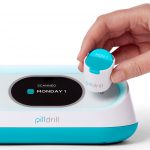 Medical adherence is an enormous challenge for the healthcare industry, with a failure to take the correct medicine at the correct time believed to cost in the region of $300bn a year, and approximately 120,000 deaths.
Medical adherence is an enormous challenge for the healthcare industry, with a failure to take the correct medicine at the correct time believed to cost in the region of $300bn a year, and approximately 120,000 deaths.
Throw into the mix the damaging impact non-adherence can have on the clinical trial process and you have a situation that needs urgent remedy.
Low-tech vs high-tech
I’ve written previously about a relatively low technology approach to improving things, with a study that was published in the Annual Review of Public Health exploring the use of text messaging to improve adherence.
Tech start-up AICure aim to tackle the problem by using smart facial recognition to test whether patients have taken their medication or not.
They combine machine learning with smartphone technology to both remind people to take their medicine, and also try and prove that they did so.
The technology sends the patient a reminder, and then requests that they use the camera built into their phone to video themselves taking the medicine.
The machine learning then kicks into gear, attempting to recognize that the person in the video is the patient, and then to identify the pill in the mouth of the patient to prove that they have taken their medicine.
Personal reminders
Suffice to say, that’s a very technically advanced solution to the problem, but the text message study reminds us that things need not be high-tech to provide benefits.
PillDrill is kind of a mixture of the two. They provide a personalized medication schedule and a scanning system that allows patients to track and monitor dosages and give us a nudge when the next dose is due.
All of this is done via a digital device called the PillDrill Hub. Users are given a kit that comes with the Hub, a couple of weekly planners and a dozen scanning tags.
The Hub is designed to sit in the home and connect via wifi to give users a range of reminders for when their next pill is due. Rather than taking pictures of the pill being taken, as with AICure, users simply scan the barcode over the Hub to say the medicine was taken.
If the user isn’t near the home, the Hub can be programmed to send a text message reminder to take the medicine on the move, and then remind them to log it when they get home.
There is also a system whereby the user can report how they’re feeling each day, with the eventual aim to provide reports on how effective the medicine has been at improving their wellbeing.
It’s certainly an interesting system, and with medical adherence such a big problem it’s promising that so many attempts are being made to improve matters. Time will tell how effective PillDrill (and indeed AI Cure) are at doing that. In the meantime, check out the video below of the system in action, and let me know your thoughts in the comments below.